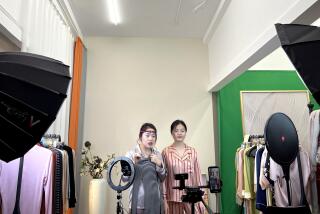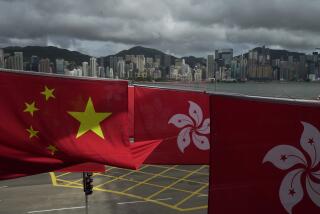In Hong Kong, baby formula feeds discord with mainland Chinese
BEIJING â In Hong Kong, baby formula has become a precious commodity, kept under lock and key.
Accusations that mainland Chinese are trying to buy up the semiautonomous territoryâs entire supply have led to near-riots and have become the latest source of discord with Beijing.
Before the recent Lunar New Year, a major gift-buying time in China, Hong Kong announced an emergency two-can limit. Inspectors patrolling the subways near the border crossing into Shenzhen, China, look for people smuggling cases of the precious powder. Hong Kong officials say they have called back customs inspectors from retirement to help prevent baby formula from being spirited to the mainland.
âIf someone tries to go over with more than the 4 pounds allowed, we are going to deal with it by the law, with no regard for circumstance,â Hong Kongâs deputy head of customs, Yu Koon-hing, said at a news conference in early February.
On Friday, the daily purchase restriction becomes permanent, along with tough new penalties of up to two years in prison and a fine of $64,500.
To ensure a secure supply for Hong Kongers, a hotline was set up Feb. 1 allowing parents to place formula orders directly with overseas warehouses. The formula mostly comes from Europe, the United States and Australia.
At its heart, the dispute cast in sharp focus Hong Kongâs fear of being swamped by 1.3 billion mainlanders, who are increasingly affluent and mobile. About 30 million Chinese, more than triple the territoryâs population, visit Hong Kong each year, and they like to shop.
They also are not averse to a bargain. Hong Kong prices are lower for many imported products because of the depreciating U.S. dollar (to which Hong Kongâs currency is pegged) and lower tariffs.
Mainland traders with hand trucks and backpacks frequently clear Hong Kong store shelves of baby formula, small electronics and imported cookies and noodles. This behavior has earned them the nickname âlocustsâ in Hong Kong.
âLook at what these locusts are taking: our places to sleep, our spots in school, our milk powder, and now our chicken broth!â one enraged resident exclaimed in a Facebook posting last month.
âChinese go back to China,â read a banner at a demonstration over baby formula and other products in September, where Hong Kong residents waved Union Jack flags, expressing nostalgia for British rule, in the days before the former colony reverted to Chinese control in 1997.
Hong Kong police last month rushed to a train station near the border crossing where Hong Kong residents had confronted an elderly mainlander transporting formula. The man was escorted out of the Sheung Shui station to prevent injury.
For Hong Kong mothers, arriving minutes after delivery trucks stop at pharmacies can mean arriving too late.
Michelle Leung started an online forum in January to help parents because of her own difficulty finding formula for her 2-year-old son. After scouring the city for the brand she wanted, she found the only pharmacy that stocked it was jammed with traffickers.
âI was really angry at that time,â Leung said.
Chow Wing-hong, a 40-year-old clerk at Fu Ming Pharmacy, said about 60% of his customers come in for baby formula and that the demand doubled just before last monthâs Lunar New Year holiday.
âThere were people asking to buy more than 10 cans, saying they would pay an extra 20 dollars [U.S. $2.60] for each can, and youâd know they must be traders,â Chow said.
Two-pound cans of powder sell for $35 in Hong Kong but can fetch more than $40 online in mainland China. The most popular brands, said Chow, are made by Mead Johnson, Wyeth and Abbott Laboratories.
Local anger is also directed at Hong Kongâs head of government, Leung Chun-ying, whom disgruntled residents accuse of being too close to the Chinese Communist Party.
When officials announced in January a system to distribute three cans of formula every two weeks to families with babies, people complained that it resembled the rationing system employed during the Japanese occupation in World War II.
In recent years, there have been frequent outbursts over issues with the mainland ranging from the serious (a now-shelved plan to add a pro-Communist Party course to elementary and secondary school curricula) to the more trivial (mainland tourists accused of violating etiquette by eating and smoking on the subways).
The baby formula problem packs a great deal of emotion because of recent scandals in China involving tainted dairy products.
âBoth our mainland and Hong Kong formulas are produced in Holland, with the same raw ingredients and quality assurance,â said Natalie Yuen, a Hong Kong-based spokeswoman for Dutch milk powder company Friso. âFrom the reports Iâve seen, the issue is that mainland consumers just trust products sold in Hong Kong more.â
According to the research group Euromonitor, Chinaâs milk powder consumption is already the largest in the world, at $12.5 billion annually. Consumption is expected to double again by 2017.
Dr. Robert Scherpbier, a health expert at UNICEF China, attributes the growth to aggressive advertising by formula companies and the difficulty of breastfeeding after the 98-day maternity leave period provided under Chinese law. âThe growth comes from insufficient regulation of the market for breast milk substitutes coupled with insufficient opportunities to breastfeed at work,â Scherpbier said.
Health experts recommend that mothers cope with the shortage by returning to breastfeeding.
Or as well-known Hong Kong writer Chip Tsao put it, with an added dig at the Chinese:
âHopefully ⦠more sucklings will turn their innocent sucking happily to their mothersâ own natural breasts,â he wrote, âas we Hongkongers did, upon the warm return to our motherland on the night of June 30, 1997.â
Hannon is a special correspondent. Special correspondent Shirley Zhao in Hong Kong contributed to this report.
More to Read
Sign up for Essential California
The most important California stories and recommendations in your inbox every morning.
You may occasionally receive promotional content from the Los Angeles Times.










